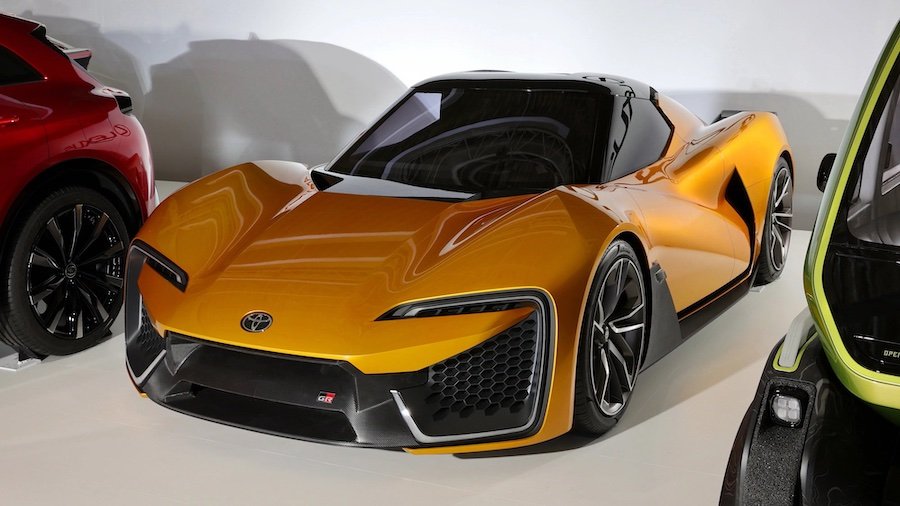Toyota MR2 primed for revival as combustion-only Mazda MX-5 rival

Toyota is priming a small, affordable sports car to rival the Mazda MX-5 for a launch within the next two years – and it’s tipped to stick with pure-combustion power.
Building on the success of its GR Yaris, GR86 and GR Supra sports cars, the company is reportedly developing a new entry-level performance model, evolved from the never-made S-FR concept.
According to Japanese magazine Best Car, the diminutive 2+2 has finally been given the green light for showrooms more than a decade after it was shown as a relatively realistic-looking concept, as Toyota seeks to capitalise on strong sales of its other driver-focused models.
Toyota declined to comment on the report when approached by Autocar, but there are strong clues that a baby Toyota coupé is indeed in the pipeline. Company chairman (and former CEO) Akio Toyoda has historically spoken of his ambition to revive the spirit of what he calls Toyota’s ‘Three Brothers’ – the MR2, Celica and Supra.
With the Supra having been revived in 2019 and the smaller GR86 occupying a similar space in the market to the Celica, the stage looks to be set for a long-awaited MR2 reboot.
Notably, Toyota has already confirmed plans to launch a new two-seat electric sports car based on last year’s striking FT-SE concept, channelling the spirit of the MR2, which went out of production in 2007.
That concept, though – while bearing a ‘mid-engined’ silhouette and a similarly compact footprint – is much more extreme in its styling and conception and is not due to enter production until towards the end of the decade.
The production version of the S-FR is said to be much closer to reality and would have more of a mass-market, everyday billing, albeit still with an overt focus on dynamic agility – qualities that characterised the original MR2 and continue to define the Mazda MX-5, which is still selling strongly in its 35th year on the market.
The S-FR (standing for small, front-engined, rear-wheel drive) was originally revealed at the 2015 Tokyo motor show and powered – theoretically, as it has only ever been drivable in the Gran Turismo video game – by a naturally aspirated 1.5-litre four-pot, sending 133bhp and 111lb ft to the rear axle via a six-speed manual gearbox.
Measuring just 3990mm long, 1695mm wide and 1320mm tall, it is almost identical in silhouette and stature to today’s MX-5 and sufficiently smaller than today’s GR86 to be theoretically viable as a ‘baby’ sports car to serve as the entry point into Toyota’s performance line-up. It is also said to weigh just 1050kg, which would make any production version among the lightest sports cars available.
Crucially, maintaining that featherweight figure will no doubt be contingent on Toyota bringing the S-FR to production without electrical assistance. It is possible that the decision to build the S-FR is linked to Toyota’s commitment to developing synthetic fuels and hydrogen-combustion technology.
GR boss Masahito Watanabe recently told Autocar that Toyota still believes “the internal combustion engine has some potential” in the sports car arena, adding: “We don’t want to give up.“It’s not over just yet, because if you look at the internal combustion engine, there’s still hydrogen combustion that can be a part of that zero-emission line-up, so I think that’s going to continue.”
Lending credence to rumours of the S-FR’s revival is the fact that Toyota-owned Daihatsu recently revealed the Vision Copen concept as an upsized and updated version of its tiny drop-top kei car, making the switch from front- to rear-wheel drive and doubling its engine capacity from 660cc to 1.3 litres.
Despite being substantially larger than its 25-year-old namesake, the Vision Copen’s dimensions are remarkably close to those of the original S-FR, at 3895mm long and 1695mm wide – and the suggestion is that production versions of the two cars would be close technical relations on the same platform.
If a new Toyota sports car is just two years away from showrooms, it is possible that the company could give more details – perhaps even stage a full unveiling – at its home motor show in Tokyo next October.
Nouvelles connexes


